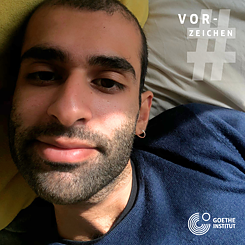Book Review #10
Armin reads 'Übergangsritus'
In his latest review for #Vorzeichen, Armin takes us on a journey through Abdalrahman Alqalaq's poetry collection Übergangsritus, which is full of vulnerability and writes about friends who have been killed and lost cities.
Übergangsritus [Rites of Passage] is the name Abdalrahman Alqalaq gave to his poetry collection, perhaps a reference to the culmination of this short collection. It’s ironic that I’m reading Übergangsritus in an airplane, while listening to Loyle Carner’s album Not Waving, But Drowning on repeat. In passage myself, I’m encountering Alqalaq’s charatures while they find their footing in the sea.
Alqalaq’s Palestinian family comes from Haifa, and he grew up in Al-Yarmūk on the outskirts of Damascus. Alqalaq’s lyric speaker always seems to return to Damascus, as well, even after leaving the city physically at the beginning of the Civil War in 2011.
After the outbreak of the war, only black goats remained. As a teenager, the lyrical speaker avoided watching when these goats were slaughtered. Now one does not leave his side, even accompanying him in the bus to the Turkish border and chewing on the pants at IS checkpoints into which his mother had sewn the memory card of his life. The goat bites his right foot, and the lyric speaker remains quiet as his friends are dragged away by IS fighters. And the goat does not surrender its black magic, even on the Greek island where the lyric speaker finally decides to slaughter it.
A boy slices into the sea with his knife and through detailed observations, Alqalaq’s poetic voice points to the denial of even one’s own right to die. Alqalaq bears witness with extreme vulnerability: witnessing the deaths of friends and the loss of entire cities. Übergangsritus is perhaps the attempt to give mourning the face of a mother whose own memories remain in those palaces: “My life that I won’t live / weaves my facial features as we devour one another.”
Abdalrahman Alqalaq’s poems are written partly in German and Arabic. The Arabic sections are translated by Günther Orth, Leila Chammaa, and Sandra Hetzl.
© Armin Djamali
Alqalaq’s Palestinian family comes from Haifa, and he grew up in Al-Yarmūk on the outskirts of Damascus. Alqalaq’s lyric speaker always seems to return to Damascus, as well, even after leaving the city physically at the beginning of the Civil War in 2011.
After the outbreak of the war, only black goats remained. As a teenager, the lyrical speaker avoided watching when these goats were slaughtered. Now one does not leave his side, even accompanying him in the bus to the Turkish border and chewing on the pants at IS checkpoints into which his mother had sewn the memory card of his life. The goat bites his right foot, and the lyric speaker remains quiet as his friends are dragged away by IS fighters. And the goat does not surrender its black magic, even on the Greek island where the lyric speaker finally decides to slaughter it.
A boy slices into the sea with his knife and through detailed observations, Alqalaq’s poetic voice points to the denial of even one’s own right to die. Alqalaq bears witness with extreme vulnerability: witnessing the deaths of friends and the loss of entire cities. Übergangsritus is perhaps the attempt to give mourning the face of a mother whose own memories remain in those palaces: “My life that I won’t live / weaves my facial features as we devour one another.”
Abdalrahman Alqalaq’s poems are written partly in German and Arabic. The Arabic sections are translated by Günther Orth, Leila Chammaa, and Sandra Hetzl.


